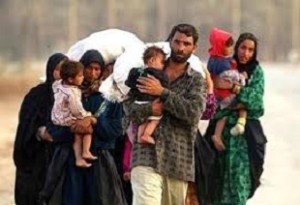
By Susan Gately - 17 January, 2016
 Migrants and refugees challenge us but our response must come from the Gospel of Mercy, says Pope Francis in his message for the World Day of Migrants and Refugees 2016 which is celebrated today (Sunday).
Migrants and refugees challenge us but our response must come from the Gospel of Mercy, says Pope Francis in his message for the World Day of Migrants and Refugees 2016 which is celebrated today (Sunday).
As refugees continue to arrive in Europe in huge numbers, with twice the number entering the European Union so far this January (18,000) to the numbers who entered during the whole of January last year, the Pope says God’s love is meant to reach out to every person.
“Those who welcome the Father’s embrace, for their part, become so many other open arms and embraces, enabling every person to feel loved like a child and “at home” as part of the one human family.”
God’s love extends to all, but particularly to those overcome by physical or moral poverty.
Migration is growing worldwide, the Pope notes. “Refugees and people fleeing from their homes challenge individuals and communities, and their traditional ways of life; at times they upset the cultural and social horizons which they encounter.”
Often exploited by human traffickers, they then have to face “latent suspicions and fear” in their new country.
Migration movements are now a structural reality, he writes, and our primary issue must be “to deal with the present emergency phase by providing programmes which address the causes of migration and the changes it entails, including its effect on the makeup of societies and peoples.”
Migrants are our brothers and sisters in search of a better life. Their identity is not a secondary issue. Those who migrate are forced to change some of their most distinctive characteristics and, so are those who welcome them.
“How can we experience these changes not as obstacles to genuine development, rather as opportunities for genuine human, social and spiritual growth,” he asks.
“Biblical revelation urges us to welcome the stranger; it tells us that in so doing, we open our doors to God.”
Pope Francis refers to the many institutions, movements and groups who have welcomed migrants and are experiencing the “wonder and joy of the feast of encounter” but says there continue to be debates about the conditions and limits to be set for the reception of migrants, “not only on the level of national policies, but also in some parish communities whose traditional tranquility seems to be threatened”.
Each of us is responsible for his or her neighbour: we are our brothers’ and sisters’ keepers, wherever they live, he affirms.
“Concern for fostering good relationships with others and the ability to overcome prejudice and fear are essential ingredients for promoting the culture of encounter, in which we are not only prepared to give, but also to receive from others. Hospitality, in fact, grows from both giving and receiving.”
We should not view migrants just from the standpoint of their status as ‘regular’ or ‘irregular’ but “as people whose dignity is to be protected and who are capable of contributing to progress and the general welfare.”
Migrations cannot be reduced merely to their political and legislative aspects, their economic implications and the concrete coexistence of various cultures in one territory.
The Church stands at the side of all who work to defend each person’s right to live with dignity, first and foremost by exercising the right not to emigrate and to contribute to the development of one’s country of origin.
This process should include, from the outset, the need to assist the countries which migrants and refugees leave.
“It is necessary to avert, if possible at the earliest stages, the flight of refugees and departures as a result of poverty, violence and persecution.”
He also calls on public opinion to be formed, to prevent “unwarranted fears and speculations detrimental to migrants”.
Today’s refugees are fleeing from criminal organisations and sexual exploitation. They “appeal to the Church and the human community to ensure that, in the outstretched hand of those who receive them, they can see the face of the Lord”.
Last September, Pope Francis appealed to parishes and religious houses across the world to take in refugees.
This week the Holy See announced that it is housing two refugee family, one from Syria, the other from Eritrea, in two apartments in the Vatican.